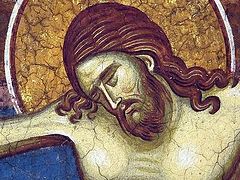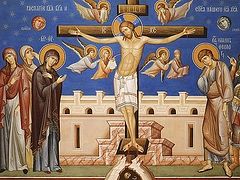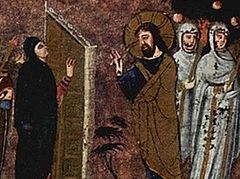These days of Holy Week abound with parables and images, through which the Lord harshly and loudly calls us from the path of perdition to Himself, to the saving path home to the Heavenly Kingdom. Today’s Gospel passage tells us about the barren fig tree.
 The Cursing of the Fig Tree Now in the morning as He returned into the city, He hungered. And when He saw a fig tree in the way, He came to it, and found nothing thereon, but leaves only (Mt. 21:18-19). The Apostle Mark adds that it was not the season of fig harvesting yet (cf. Mk. 11:13). Other fig trees did not have fruit either, but they also did not have leaves, since fig trees first produce fruit, and then leaf out. But the fig tree in question only deceived wayfarers, enticing them to approach it, with its verdant appearance promising them fruit that was not there.
The Cursing of the Fig Tree Now in the morning as He returned into the city, He hungered. And when He saw a fig tree in the way, He came to it, and found nothing thereon, but leaves only (Mt. 21:18-19). The Apostle Mark adds that it was not the season of fig harvesting yet (cf. Mk. 11:13). Other fig trees did not have fruit either, but they also did not have leaves, since fig trees first produce fruit, and then leaf out. But the fig tree in question only deceived wayfarers, enticing them to approach it, with its verdant appearance promising them fruit that was not there.
The meaning of the withered fig tree becomes clear from the following two parables that Christ related on the same day after He had cursed the fig tree. These are the parables of the two sons and of the wicked husbandmen. The fig tree that promises fruit represents these characters—the son who said, I go, sir: and went not (Mt. 21:30), and the wicked husbandmen who should have given back fruit from the vineyard in due season, but instead did harm.
Every creature in the world has its God-given purpose and mission. The fig tree, for instance, was supposed to produce fruit in due season.
What fruits does the Lord expect from us? The Apostle Paul enumerates them in his Epistle to the Galatians: But the fruit of the Spirit is love, joy, peace, longsuffering, gentleness, goodness, faith, meekness, temperance… (Gal. 5:22–23).
We can perform all the prayer rules, go to church every day, read the Gospel and the Holy Fathers, observe all the rules prescribed by the Typikon and at the same time have no fruits of the spiritual life.
On the one hand, the parable of the fig tree is about the Israelites, who were chosen by God, “covered”, like trees, by the “leaves” of Divine Law, but did not bear worthy fruits. On the other hand, this parable is about me and you. The Lord brought us to His Church, planted us by the rivers of water (cf. Ps. 1:3), gave us all the means for salvation, growth and fruition—the Holy Scriptures, the Church itself, His grace, and He even gives us Himself in Communion. And He quite rightly expects growth and fruits from us. But for most of us, at best, “things are still right where they started”.
The parable that Christ had earlier told His disciples will help us understand the meaning of the cursing of the fig tree better. A certain man had a fig tree planted in his vineyard; and he came and sought fruit thereon, and found none. Then said he unto the dresser of his vineyard, Behold, these three years I come seeking fruit on this fig tree, and find none: cut it down; why cumbereth it the ground? And he answering said unto him, Lord, let it alone this year also, till I shall dig about it, and dung it: And if it bear fruit, well: and if not, then after that thou shalt cut it down (Lk. 13:6–9).
The Lord treasures every fig tree, every human soul. Each of us knows how long the Lord has been patient with us, “dunging” us, “digging about us”, begging us to improve and come to Him, our loving Father. He is long-suffering, but we do not know when the “three-year period” from the parable, in which the Lord still puts up with us, will elapse.
 The cursing of the fig tree. Fresco of the Holy Transfiguration Monastery
The cursing of the fig tree. Fresco of the Holy Transfiguration Monastery
In one of his homilies the holy Hiero-Confessor Luke of Crimea noted, “Why did Christ curse the fig tree? To teach us that we should tremble when we hear about it… We should not be deceived by the thought that our Lord is infinitely merciful and good and will surely forgive our sins. Many, many deceive themselves with this hope, and in this parable, and above all through the cursing of the fig tree, we learn that the Lord is not always infinitely merciful.”
The holy New Hiero-Confessor Basil of Kineshma wrote about the same thing in his commentary to this parable: “His judgment can be not only lenient, but also strict and fair. Let those who flatter themselves with hopes for an all-forgiving God, without caring about self-improvement, keep this in mind.”
And there are also other words that complete the call for our reform. They are about the signs of the end of the world: For wheresoever the carcase is, there will the eagles be gathered together (Mt. 24:28). Archbishop Averky (Taushev) writes, “Just as birds of prey gather where by a corpse, God’s judgment will appear where the inner life has died away and moral decay has started”1
The words from the Gospel of Mark that the time of figs was not yet (Mk. 11:13) emphasize that the people of Israel had missed their chance. Christ came, but the Israelites were not ready to accept Him. In cursing the fig tree, the Lord, like the ancient prophets, showed the impending judgment on Israel. In another parable, of the wicked husbandmen, the Lord also speaks about the time limit: And when the time of the fruit drew near, he sent his servants to the husbandmen, that they might receive the fruits of it (Mt. 21:34).
Moreover, in the parable of the talents, when the master came and demanded an account of the funds (talents) he had invested; and in the parable of the ten virgins, when the doors to the wedding feast were closed and the latecomers were not let in, in these final days before Pascha the Gospel often warns us against spiritual procrastination, against constantly postponing our spiritual life until later, until the evening, until tomorrow…
The Lord warns us strictly: Watch therefore, for ye know neither the day nor the hour wherein the Son of man cometh (Mt. 25:13); Walk while ye have the light, lest darkness come upon you (Jn. 12:35); The night cometh, when no man can work (Jn. 9:4). Our fruits do not grow overnight—both time and effort are required.
Let us not delay our salvation and spiritual growth; let us try right now to bear fruit that will be pleasing to our Lord. Amen.





